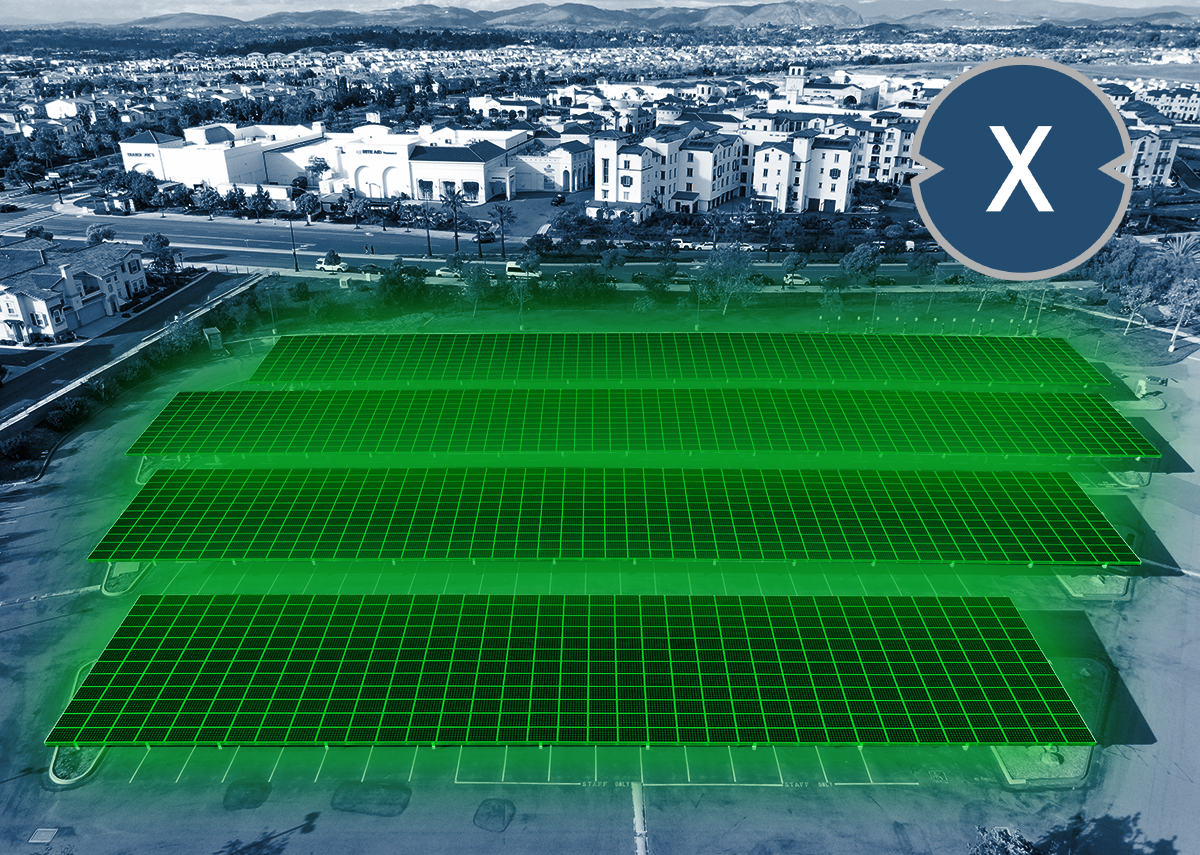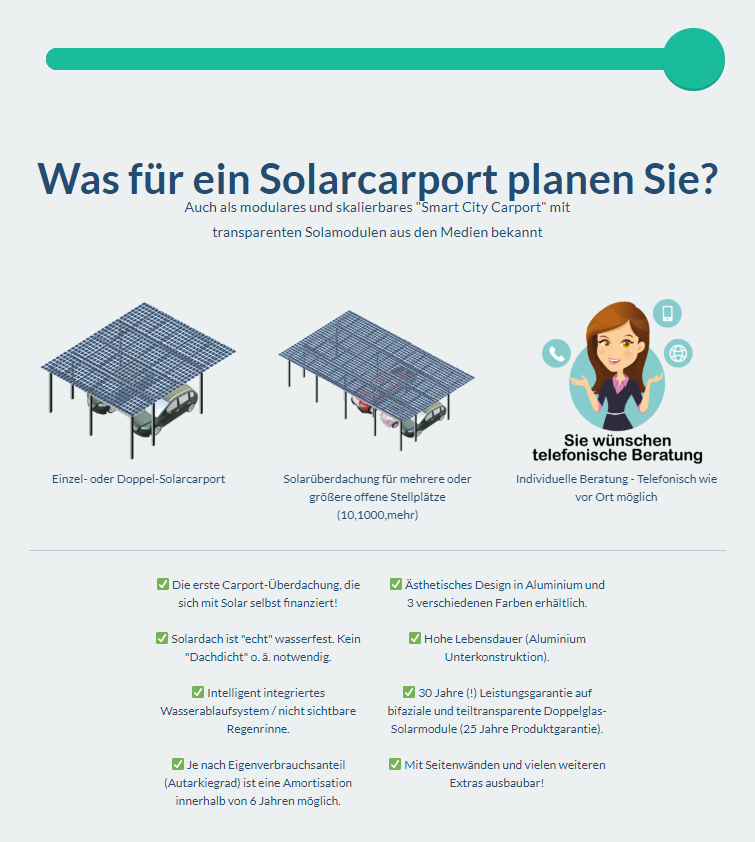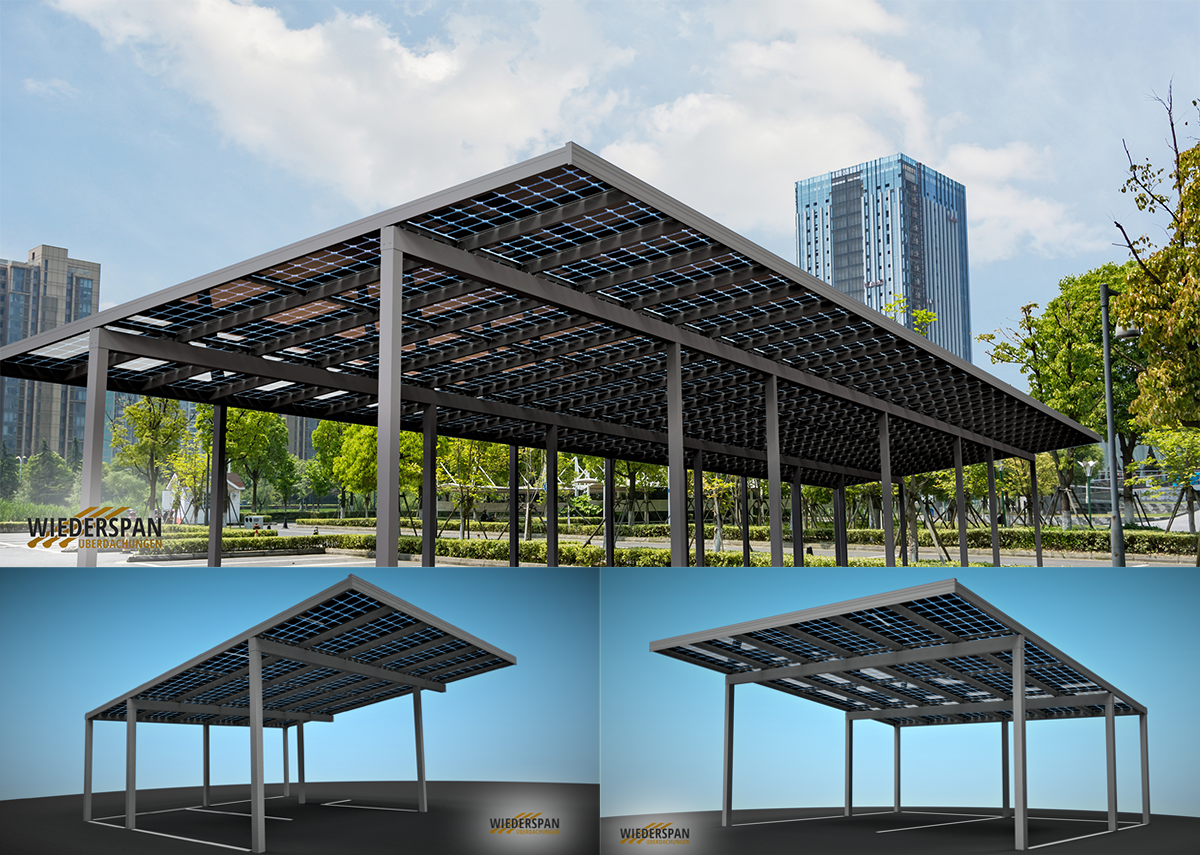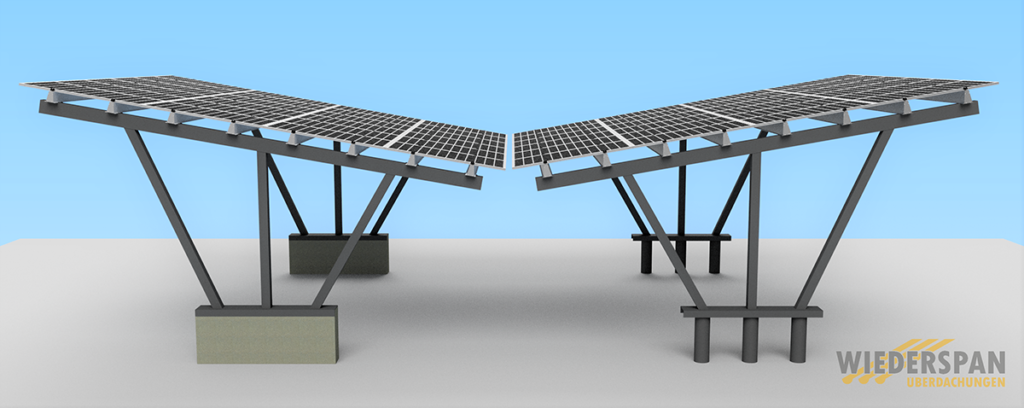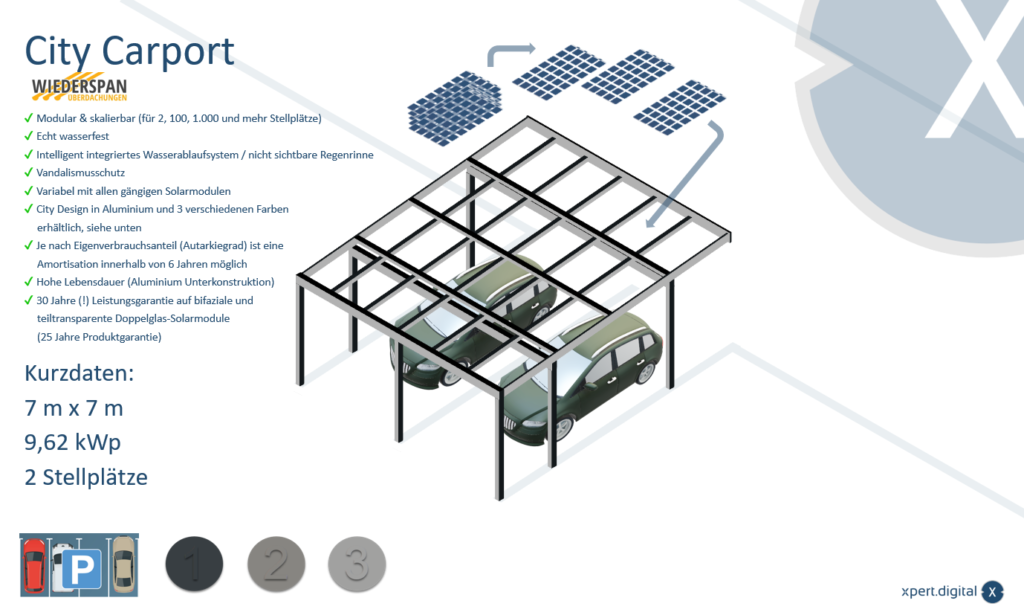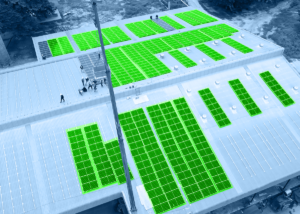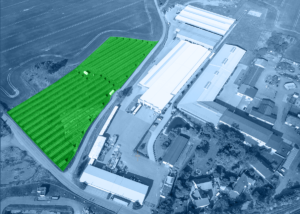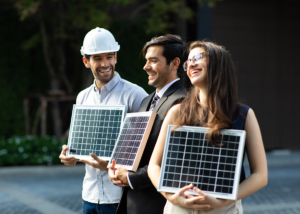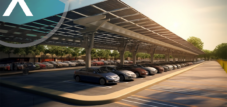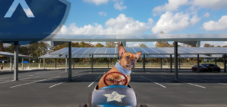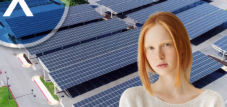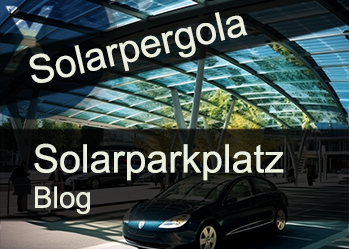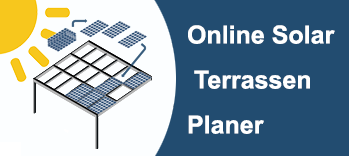Efficient use of solar parking spaces and solar carports: Solar parking spaces as an innovative energy solution – Smart Parking Lot System
Language selection 📢
Published on: October 6, 2023 / update from: October 6, 2023 - Author: Konrad Wolfenstein
🌞🚗 Introduction: Solar parking spaces as an innovation 🚗🌞
The efficient use of solar parking spaces represents an innovative method to generate and use energy sustainably. This type of dual use of land has become more important in recent years, not least due to the growing urgency to combat climate change. Installing solar panels over parking lots can not only reduce energy costs, but also promote renewable energy sources. But how can energy production and use on solar parking spaces be optimized? There are various strategies for this, which are discussed in more detail below.
💡🛠 Technological improvements 🛠💡
One of the most obvious ways to optimize is to use more efficient solar technologies. New generations of solar cells, such as bifacial models that can absorb energy from both sides, are particularly promising here. But the type of installation also plays a role.
🎛🌐 Intelligent energy management systems 🌐🎛
Another important aspect is the introduction of intelligent energy management systems. These systems can control energy distribution to ensure that the energy produced is used optimally. For example, you can decide in real time whether the energy should be used directly, stored or fed into the grid.
⚡🚘 Synergy effects with electromobility 🚘⚡
Connecting solar parking spaces with charging stations for electric vehicles creates synergy effects. Directly using the energy generated to charge vehicles not only increases efficiency, but also reduces dependence on fossil fuels.
🌦🛖 Customizable canopies 🛖🌦
Solar parking lots should be designed to be flexible to adapt to different weather conditions. An example of this would be a retractable canopy that exposes more solar panels in strong sunlight and retracts in bad weather to protect technology.
💰🤝 Funding and financing 🤝💰
The economic feasibility of solar parking spaces can be improved through various funding programs and financing models. Public-private partnerships or special financing models are conceivable here in order to reduce the initial investments.
📚🗣 Awareness and education 🗣📚
The general public needs to be educated about the benefits of solar parking spaces. This can be done through information campaigns or through integration into school lessons. Higher adoption and demand can reduce the price of the technology, which in turn leads to faster adoption.
♻️🌱 Sustainability aspects 🌱♻️
In addition to generating energy, solar parking spaces can also be optimized by installing sustainable materials and resource-saving technologies. For example, using recycled materials for cabling or using energy-saving LEDs for lighting could be considered.
🏙🚌 Integration into urban infrastructures 🚌🏙
The optimal use of solar parking spaces can also be promoted through their integration into existing or planned urban infrastructure. By linking to public transport systems or other urban facilities, usage and thus energy efficiency could be increased.
🔍🌿 Enormous potential for sustainable energy production 🌿🔍
Solar parking spaces offer enormous potential for sustainable energy production and use. The efficiency of these systems can be significantly increased through technological innovations, intelligent energy management systems, synergies with electromobility and a number of other strategies. They therefore represent a promising opportunity to advance the transition to a more sustainable energy supply.
📣 Similar topics
- 🌞 Solar Parking Optimization: What You Need to Know
- 🛠 Technological improvements in solar parking lots
- 💡 Intelligent energy management systems for solar systems
- 🚗 Synergy effects between solar parking spaces and electromobility
- 🌦 Customizable solar parking canopies
- 💰 Promotion and financing of solar parking spaces
- 📚 Raising awareness and education about solar parking spaces
- ♻️ Sustainability aspects in solar parking spaces
- 🏙 Integration of solar parking spaces into urban infrastructures
- 🌱 Solar parking spaces as a key to sustainable energy
#️⃣ Hashtags: #Solar energy #Electromobility #Sustainability #Energymanagement #Urbandevelopment
The Xpert.Solar solar carport planner
Solar parking spaces are a promising way to generate renewable energy while optimizing limited space requirements in cities and urban areas. However, there are actually some challenges that can complicate the introduction of such parking spaces.
One of the biggest hurdles is the high cost and planning effort associated with installing solar panels in parking lots. Not only must the cost of the solar panels themselves be taken into account, but also the cost of the infrastructure required to connect the panels to the grid. In addition, the space required for installing the solar modules must be precisely planned and coordinated to ensure effective use of the available space.
Another obstacle are bureaucratic hurdles and approval processes that can make it difficult to install solar panels in parking lots. Depending on the region or country, different rules and regulations may apply, which can complicate the approval and implementation process.
Despite these challenges, there is high demand for solar parking spaces as they represent an effective way to promote renewable energy while optimizing space requirements in urban areas. With careful planning and collaboration between the parties involved, the hurdles can be overcome to facilitate the introduction of such parking spaces.
➡️ We specialize in providing advisory and planning support for such solar carport projects and advancing their implementation.
➡️ With our solar carport planner we simplify the process.
➡️ We are there for you for the next steps and thus minimize costs and effort for you.
More about it here:
The scalable city solar carport module for companies, cities and communities
More about it here:
We can also offer alternative large solar parking systems!
👉🏻 Let us advise you 👈🏻
👉🏻 Cars as well as trucks possible! 👈🏻
We would be happy to help you find the optimal solar roofing for you together.
Our favorite city solar carport or solar carport module
The advantages at a glance
- Support & Made in Germany
- Modular & scalable (for 2, 100, 1,000 and more parking spaces)
- Really waterproof
- Integrated water drain / invisible rain gutter
- Vandalism protection, optionally with integrated impact protection
- Variable with all common solar modules
- City design available in aluminum and 3 different colors
- Depending on the amount of self-consumption (degree of self-sufficiency), amortization is possible within 6 years
- Long service life (aluminum substructure)
- 30-year (!) performance guarantee on bifacial and partially transparent double-glass solar modules (25-year product guarantee)
- Reducing urban heat islands
- Building-integrated photovoltaics
- Ideal for transparent and translucent double-glass solar modules with overhead mounting approval!
🌞🚗 Introduction: Solar parking spaces as an innovative energy solution
The efficient use of solar parking spaces represents an innovative method to generate and use energy sustainably. This type of dual use of land has become more important in recent years, not least due to the growing urgency to combat climate change. Installing solar panels over parking lots can not only reduce energy costs, but also promote renewable energy sources. But how can energy production and use on solar parking spaces be optimized? There are various strategies for this, which are discussed in more detail below.
⚙️🌞 Technological improvements
One of the most obvious ways to optimize is to use more efficient solar technologies. New generations of solar cells, such as bifacial models that can absorb energy from both sides, are particularly promising here. But the type of installation also plays a role. Efficiency can be increased through movable solar panels that follow the path of the sun.
🔌🧠 Intelligent energy management systems
Another important aspect is the introduction of intelligent energy management systems. These systems can control energy distribution to ensure that the energy produced is used optimally. For example, you can decide in real time whether the energy should be used directly, stored or fed into the grid.
⚡🚘 Synergy effects with electromobility
Connecting solar parking spaces with charging stations for electric vehicles creates synergy effects. Directly using the energy generated to charge vehicles not only increases efficiency, but also reduces dependence on fossil fuels.
🌦️🛡️ Customizable canopies
Solar parking lots should be designed to be flexible to adapt to different weather conditions. An example of this would be a retractable canopy that exposes more solar panels in strong sunlight and retracts in bad weather to protect technology.
💰🤝 Funding and financing
The economic feasibility of solar parking spaces can be improved through various funding programs and financing models. Public-private partnerships or special financing models are conceivable here in order to reduce the initial investments.
📣🎓 Raising awareness and education
The general public needs to be educated about the benefits of solar parking spaces. This can be done through information campaigns or through integration into school lessons. Higher adoption and demand can reduce the price of the technology, which in turn leads to faster adoption.
🌱♻️ Sustainability aspects
In addition to generating energy, solar parking spaces can also be optimized by installing sustainable materials and resource-saving technologies. For example, using recycled materials for cabling or using energy-saving LEDs for lighting could be considered.
🏙️🚇 Integration into urban infrastructures
The optimal use of solar parking spaces can also be promoted through their integration into existing or planned urban infrastructure. By linking to public transport systems or other urban facilities, usage and thus energy efficiency could be increased.
📜🌱 Solar parking spaces and intelligent energy management systems
Solar parking spaces offer enormous potential for sustainable energy production and use. The efficiency of these systems can be significantly increased through technological innovations, intelligent energy management systems, synergies with electromobility and a number of other strategies. They therefore represent a promising opportunity to advance the transition to a more sustainable energy supply.
📣 Similar topics
- 🌞 Efficient solar technologies: The path to optimizing solar parking spaces
- 🎛️ Intelligent energy management systems: How to use energy better
- 🚗 Synergy between solar parking spaces and electromobility
- 🌦 Adjustable Solar Parking Canopies: Flexibility in any weather
- 💰 Funding programs and financing models for solar parking spaces
- 📚 Awareness and Education: Educate the public about solar parking spaces
- 🌿 Sustainability aspects in the design of solar parking spaces
- 🏙 Integration into urban infrastructures: solar parking spaces as part of the ecosystem
- 🔄 Bifacial solar cells and movable panels: The latest technologies
- 🌱 From solar parking spaces to sustainable energy supply: A conclusion
#️⃣ Hashtags: #Solartechnology #Energymanagement #Electromobility #Sustainability #UrbanInfrastructure
🌞💡 Efficient use of solar parking spaces
Efficient use of solar parking spaces is an emerging approach to generate sustainable energy while minimizing space requirements. Solar parking lots combine photovoltaic technology with parking lot infrastructure to provide dual use of the land. Solar panels are used as roofing for parking spaces, which not only protects vehicles from the weather, but also generates electricity from solar radiation.
⚙️🔋 Strategies to optimize energy production
1. Orientation of the solar panels
One of the most basic optimization strategies is properly orienting panels to capture the maximum amount of sunlight. In the Northern Hemisphere, the orientation should ideally be south.
2. Variable tilt angles
Modern solar panel systems offer the possibility of changing the angle of inclination of the panels. This allows them to adapt to the position of the sun over the course of the day or year in order to increase their energy output.
3. Efficient solar cells
The use of highly efficient solar cells such as monocrystalline cells can significantly increase electricity generation.
4. Energy storage
Battery storage can be used to absorb excess energy and release it again when needed. This increases efficiency and enables security of supply.
5. Intelligent surveillance systems
Through the use of sensors and advanced software, the operation of the system can be constantly monitored and adjusted.
🔌🚗 Strategies to optimize energy use
1. Load management
An intelligent load management system can optimize the distribution of electricity within the parking lot, for example by preferentially charging electric vehicles when the electricity surplus is high.
2. Integration with the power grid
By interfacing with the general grid, excess energy can be fed back into the grid, resulting in better overall efficiency and cost-effectiveness.
3. Multifunctionality
The solar parking lot can also be equipped with charging stations for electric cars, digital display boards and smart lighting systems that are also solar powered.
4. Use of IoT
Internet of Things (IoT) can be used to remotely monitor and control the system, enabling more precise and time-efficient control.
💰🌿 Socio-economic aspects
1. Economic benefits
By dual-using parking spaces as solar parking spaces, companies and cities can reduce their energy costs while generating income by providing charging infrastructure for electric cars.
2. Environmental aspects
The CO2 savings through the generation of clean electricity can make a significant contribution to environmental protection and to achieving climate goals.
3. Public perception
As an innovative and environmentally friendly concept, solar parking spaces can have a positive impact on public perception and thus increase acceptance of renewable energies.
🎯🌱 Conclusion
Solar parking spaces represent an excellent opportunity to generate sustainable energy and meet energy needs without requiring additional land. By integrating modern technologies and intelligent systems, efficiency in both energy production and use can be significantly increased. They also offer economic and environmental benefits that make them an attractive investment for the future.
📣 Similar topics
- 🌞 Solar parking spaces: The future of energy production
- 🔋 Optimization of energy storage in solar parking spaces
- 🌿 Solar parking spaces and their contribution to environmental protection
- 🚗 Electromobility: Integration with solar parking spaces
- 📈 Economic advantages of solar parking spaces
- 📊 Strategies to maximize solar energy yield
- 💡 Intelligent monitoring systems in solar energy
- 🔌 Connection to the power grid: why it is important
- 🌐 Internet of Things (IoT) in use for solar parking spaces
- 🧠 Load management: Intelligent power distribution in solar parking spaces
#️⃣ Hashtags: #SolarEnergy #Sustainability #Electromobility #EnergyOptimization #Environmental Protection
🌞 The Bluefield model for solar parking and solar carport solutions for cities and communities, industry and retail
Solar parking spaces and solar carports are innovative solutions that combine energy production and environmental protection. The Bluefield model offers a pioneering approach to the use of solar energy in various sectors, including cities and towns, industry and retail. In this article, we will take an in-depth look at the Bluefield model, explore its benefits, and understand why it is gaining traction across various sectors.
🌍 What is the Bluefield model?
The Bluefield model is an innovative strategy for integrating photovoltaic technology into parking and carport structures. It is designed to generate clean energy while making optimal use of existing infrastructure. This solution is characterized by the installation of solar panels on parking lot roofs or carports to convert solar energy into electrical energy. This energy can then be used for various purposes, such as charging electric vehicles, lighting parking lots or feeding into the electricity grid.
🏢 Application areas of the Bluefield model
1. Cities and towns
The Bluefield model offers cities and communities a sustainable way to meet their energy needs while reducing environmental impact. By installing solar parking spaces in public parks or on municipal buildings, municipalities can contribute to the energy transition and reduce dependence on fossil fuels.
2. Industry
Energy is an important cost factor in industry. The Bluefield model enables industrial companies to reduce their energy costs while minimizing their environmental impact. Solar carports can be installed on factory premises or warehouse areas to cover some of the energy needs.
3. Retail
In retail, the Bluefield model can help reduce energy costs for shopping centers and supermarkets. Solar carports in parking lots not only provide protection from the elements, but also generate green electricity that can be used in stores.
☀️ Advantages of the Bluefield model
The Bluefield model offers a variety of advantages that make it an attractive solution for various sectors:
1. Sustainable energy production
By using solar energy, the Bluefield model helps reduce greenhouse gas emissions and promotes the transition to renewable energy.
2. Cost savings
Solar power generation reduces energy costs, which is financially beneficial for companies and communities.
3. Environmental protection
Integrating solar energy into parking structures reduces the need for additional land while protecting the environment from pollution.
4. Electromobility
Solar carports can be used to charge electric vehicles with clean energy, supporting the spread of electric mobility.
5. Image gain
Companies and communities that implement the Bluefield model demonstrate their commitment to sustainability and environmental protection, which can strengthen the image.
🔧 Implementation of the Bluefield model
Implementing the Bluefield model requires careful planning and technical expertise. Here are some steps to consider when implementing it:
1. Location selection
The selection of locations for solar parking spaces or carports is crucial. They should be exposed areas with sufficient sunlight.
2. Solar panel design
The type and design of solar panels must be carefully selected to ensure maximum energy production.
3. Grid feed
In some cases, excess solar power can be fed into the public power grid. The legal framework and regulations must be observed.
4. Charging infrastructure
If the installation is intended for charging electric vehicles, the appropriate charging infrastructure must be provided.
5. Maintenance and monitoring
Regular maintenance and monitoring of solar panels is important to ensure optimal performance.
🌍 Examples of successful implementations
The Bluefield model has already been successfully implemented in various regions. Here are some examples:
1. Baden-Württemberg, Germany
The state of Baden-Württemberg promoted the installation of photovoltaic systems on existing parking spaces in order to generate clean energy and promote sustainability in the region.
2. Upper Austria, Austria
In Upper Austria there is the City Solar Carport, which uses solar energy in parking spaces and demonstrates the potential of parking lot PV.
3. Solar carports in Germany
In Germany, solar carports are vehicle roofs equipped with solar modules that are becoming increasingly popular and allow electric vehicles to be charged with solar energy.
4. Vorarlberg, Austria
In Vorarlberg, modular solar carport systems are offered that support the planning and implementation of solar energy in parking spaces.
🌟 Solar parking and solar carport solutions
The Bluefield model for solar parking and solar carport solutions offers a sustainable way to use solar energy in various sectors. It promotes environmental friendliness, reduces energy costs
📣 Similar topics
- 🌞 Sustainable energy for the future: The Bluefield model
- 💡 The solar parking revolution: Bluefield in focus
- 🏙️ Cities in Transition: The Bluefield Model for Clean Energy
- 🏭 Industry 4.0: How the Bluefield model reduces costs
- 🛒 Green retail: Energy efficiency through solar carports
- 🌍 Environmental protection and sustainability: The Bluefield model explained
- ⚡ Electromobility on the rise: thanks to Bluefield
- 🏗️ The technology behind it: solar modules in the Bluefield model
- 🌐 Global perspectives: Bluefield successful worldwide
- 📈 Economic added value: The Bluefield model in action
#️⃣ Hashtags: #BluefieldModel #SustainableEnergy #Solarparking #Solarcarports #EnvironmentalProtection
📊 Introduction to the Bluefield model
The Bluefield model is an interesting method for planning and executing projects, especially in complex or rapidly changing environments. This model originally comes from business administration and was developed to optimize the effectiveness of investments and resources.
🔍 Origin of the Bluefield model
The exact origins of the Bluefield model are not easy to trace, but it often originates from management consulting firms that specialize in change management and process optimization. These companies recognize that traditional project management methods are not always sufficient to address the complex challenges of modern business environments. The Bluefield model was developed to bridge the gap between theory and practice and provide a multi-dimensional, flexible approach to project management.
🎯 Basic principles and purpose
The main purpose of the Bluefield model is to optimize processes and resources. It takes a holistic view of projects and considers not only financial aspects, but also quality criteria, time frames and human resources. This broad perspective allows companies to create more realistic and adaptable plans that consider both short-term and long-term goals.
❓ Is it the best method?
Whether the Bluefield model is the best option for planning and implementing projects depends on various factors. It is particularly suitable for large, complex projects where many stakeholders are involved and where the room for error is minimal. However, for smaller, less complex projects it might be found to be too large or unwieldy. In such cases, other agile methods such as Scrum or Kanban might be more suitable.
🛠️ Areas of application
The Bluefield model is often used in IT, healthcare, manufacturing, and other industries that experience high levels of complexity and change. In these sectors, it can serve as a tool to increase efficiency and minimize risks. It also helps provide clarity about roles and responsibilities within the project, leading to improved communication and collaboration.
⚖️ Weaknesses and criticism
The model is not without its critics. Some experts argue that the Bluefield model is too theoretical and does not provide enough practical guidance for project implementation. Others see it as overly complicated and claim that it can burden project teams with unnecessary steps and processes.
🛡️ Useful tool
The Bluefield model is a useful tool for planning and implementing complex projects. It provides a comprehensive framework that takes into account various aspects such as time, cost, quality and human resources. Whether it is the best method or not depends on the specific nature of the project and the needs of stakeholders. As with any other tool, its application should be carefully considered and adapted to the specific context.
📣 Similar topics
1️⃣ The Bluefield Model: An Overview 📘
2️⃣ Origin of the Bluefield Model: Where does it come from?
🌳 3️⃣ Bluefield vs. Traditional Project Management: A Comparison 🤔
4️⃣ Basic principles of the Bluefield model: What's behind it?
🛠️ 5️⃣ Is Bluefield the best method for your project?
🎯 6️⃣ Areas of application of the Bluefield model: Where is it used?
🌐 7️⃣ Bluefield in healthcare and IT: A case study 🏥💻
8️⃣ Criticisms and weaknesses of the Bluefield model 🚫
9️⃣ Bluefield: A tool for complex projects 🧰
🔟 Bluefield in practice: success stories and pitfalls 📈
#️⃣ Hashtags: #BluefieldModel #Project Management #Process Optimization #Change Management #Stakeholder Participation
- Warehouses, production halls and industrial halls with their own power source from a photovoltaic roof system - Image: NavinTar|Shutterstock.com
- Industrial plant with its own power source from an outdoor photovoltaic system - Image: Peteri|Shutterstock.com
- Plan solar systems with photovoltaic solutions for freight forwarding and contract logistics
- B2B solar systems and photovoltaic solutions & advice
- Plan photovoltaics for warehouses, commercial halls and industrial halls
- Industrial plant: Plan a photovoltaic open-air system or open-space system
- Plan solar systems with photovoltaic solutions for freight forwarding and contract logistics
- B2B solar systems and photovoltaic solutions & advice
We are there for you - advice - planning - implementation - project management
☑️ From simple solar carports to large parking spaces
☑️ Your individual photovoltaic parking space advice with Xpert.Solar
Xpert.Solar is your ideal partner for the planning, consulting and construction implementation of ground-mounted photovoltaic systems and agricultural photovoltaic projects due to our many years of experience and expertise in the solar energy industry. Xpert.Solar has an experienced team of professionals that offers tailored solutions to farmers and investors. From location analysis to financial and legal advice to technical implementation and monitoring, Xpert.Solar supports its customers professionally and reliably to ensure successful and sustainable implementation.
I would be happy to serve as your personal advisor.
You can contact me by filling out the contact form below or simply call me on +49 89 89 674 804 (Munich) .
I'm looking forward to our joint project.
Xpert.Digital - Konrad Wolfenstein
Xpert.Digital is a hub for industry with a focus on digitalization, mechanical engineering, logistics/intralogistics and photovoltaics.
With our 360° business development solution, we support well-known companies from new business to after sales.
Market intelligence, smarketing, marketing automation, content development, PR, mail campaigns, personalized social media and lead nurturing are part of our digital tools.
You can find out more at: www.xpert.digital - www.xpert.solar - www.xpert.plus



